Assessing COVID-19's Influence on Leadership and Employee Motivation
VerifiedAdded on 2022/12/28
|8
|1872
|77
Report
AI Summary
This report examines the significant impact of the COVID-19 pandemic on leadership and employee motivation within organizations. It analyzes how remote work, lockdowns, and economic uncertainty have affected employee morale, engagement, and productivity. The report discusses the challenges leaders face in maintaining communication, fostering a sense of community, and addressing employee concerns during times of crisis. It explores various leadership strategies, including transparent communication, prioritizing employee well-being, and adapting to the changing work environment. The report also highlights the importance of understanding employee needs and utilizing motivational theories to enhance engagement. The conclusion emphasizes the crucial role of leadership in navigating the pandemic's effects and fostering a resilient and motivated workforce. The report references various academic sources to support its analysis.
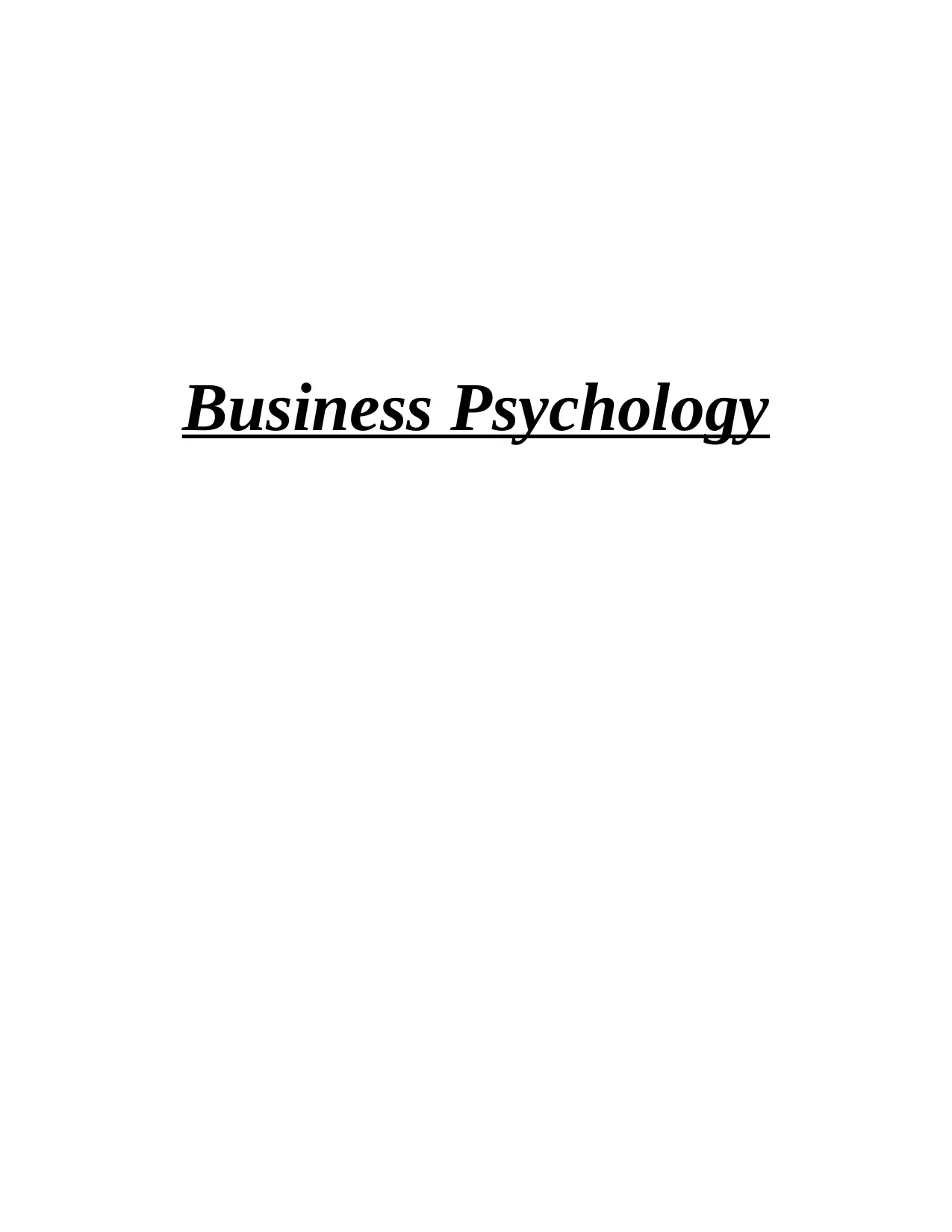
Business Psychology
Paraphrase This Document
Need a fresh take? Get an instant paraphrase of this document with our AI Paraphraser
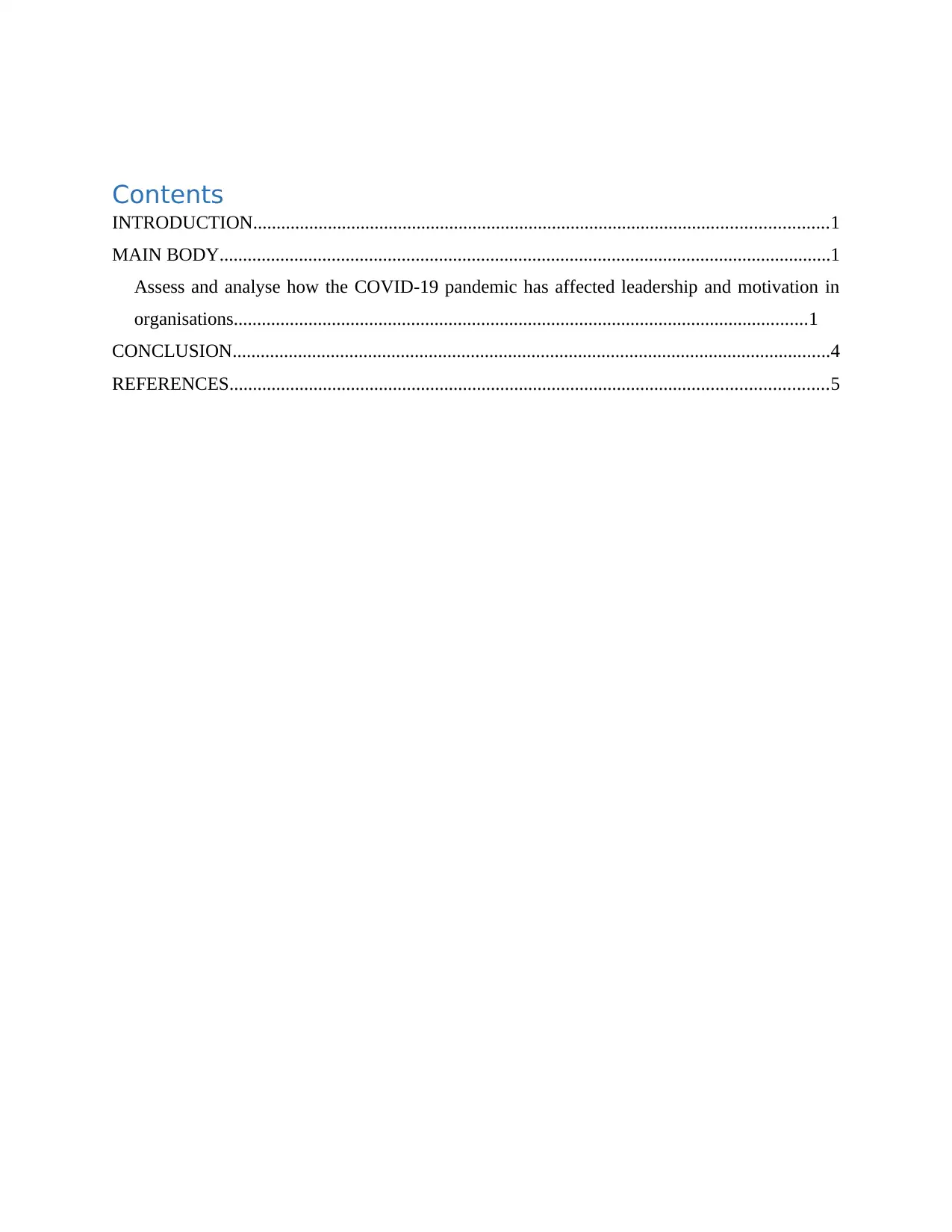
Contents
INTRODUCTION...........................................................................................................................1
MAIN BODY...................................................................................................................................1
Assess and analyse how the COVID-19 pandemic has affected leadership and motivation in
organisations...........................................................................................................................1
CONCLUSION................................................................................................................................4
REFERENCES................................................................................................................................5
INTRODUCTION...........................................................................................................................1
MAIN BODY...................................................................................................................................1
Assess and analyse how the COVID-19 pandemic has affected leadership and motivation in
organisations...........................................................................................................................1
CONCLUSION................................................................................................................................4
REFERENCES................................................................................................................................5

⊘ This is a preview!⊘
Do you want full access?
Subscribe today to unlock all pages.

Trusted by 1+ million students worldwide
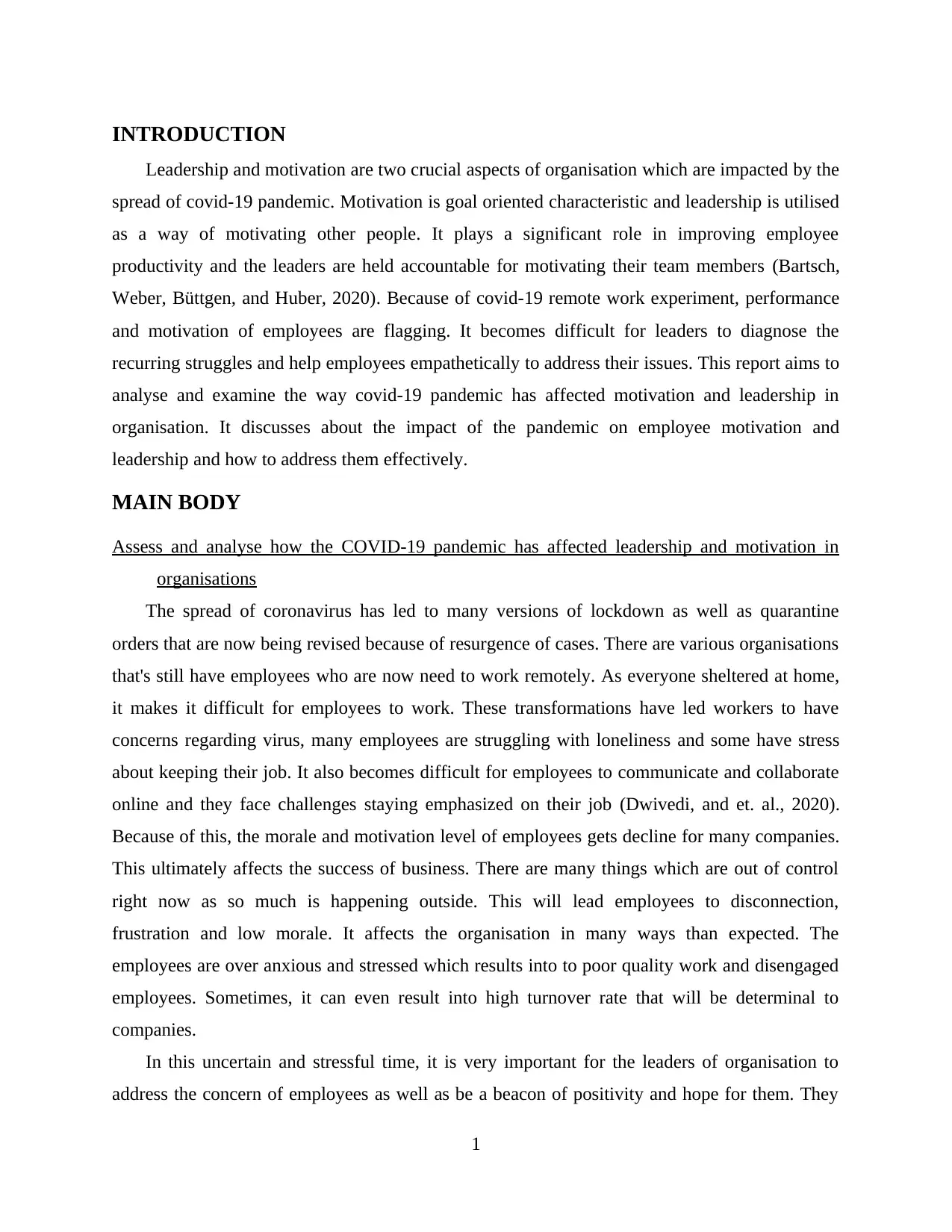
INTRODUCTION
Leadership and motivation are two crucial aspects of organisation which are impacted by the
spread of covid-19 pandemic. Motivation is goal oriented characteristic and leadership is utilised
as a way of motivating other people. It plays a significant role in improving employee
productivity and the leaders are held accountable for motivating their team members (Bartsch,
Weber, Büttgen, and Huber, 2020). Because of covid-19 remote work experiment, performance
and motivation of employees are flagging. It becomes difficult for leaders to diagnose the
recurring struggles and help employees empathetically to address their issues. This report aims to
analyse and examine the way covid-19 pandemic has affected motivation and leadership in
organisation. It discusses about the impact of the pandemic on employee motivation and
leadership and how to address them effectively.
MAIN BODY
Assess and analyse how the COVID-19 pandemic has affected leadership and motivation in
organisations
The spread of coronavirus has led to many versions of lockdown as well as quarantine
orders that are now being revised because of resurgence of cases. There are various organisations
that's still have employees who are now need to work remotely. As everyone sheltered at home,
it makes it difficult for employees to work. These transformations have led workers to have
concerns regarding virus, many employees are struggling with loneliness and some have stress
about keeping their job. It also becomes difficult for employees to communicate and collaborate
online and they face challenges staying emphasized on their job (Dwivedi, and et. al., 2020).
Because of this, the morale and motivation level of employees gets decline for many companies.
This ultimately affects the success of business. There are many things which are out of control
right now as so much is happening outside. This will lead employees to disconnection,
frustration and low morale. It affects the organisation in many ways than expected. The
employees are over anxious and stressed which results into to poor quality work and disengaged
employees. Sometimes, it can even result into high turnover rate that will be determinal to
companies.
In this uncertain and stressful time, it is very important for the leaders of organisation to
address the concern of employees as well as be a beacon of positivity and hope for them. They
1
Leadership and motivation are two crucial aspects of organisation which are impacted by the
spread of covid-19 pandemic. Motivation is goal oriented characteristic and leadership is utilised
as a way of motivating other people. It plays a significant role in improving employee
productivity and the leaders are held accountable for motivating their team members (Bartsch,
Weber, Büttgen, and Huber, 2020). Because of covid-19 remote work experiment, performance
and motivation of employees are flagging. It becomes difficult for leaders to diagnose the
recurring struggles and help employees empathetically to address their issues. This report aims to
analyse and examine the way covid-19 pandemic has affected motivation and leadership in
organisation. It discusses about the impact of the pandemic on employee motivation and
leadership and how to address them effectively.
MAIN BODY
Assess and analyse how the COVID-19 pandemic has affected leadership and motivation in
organisations
The spread of coronavirus has led to many versions of lockdown as well as quarantine
orders that are now being revised because of resurgence of cases. There are various organisations
that's still have employees who are now need to work remotely. As everyone sheltered at home,
it makes it difficult for employees to work. These transformations have led workers to have
concerns regarding virus, many employees are struggling with loneliness and some have stress
about keeping their job. It also becomes difficult for employees to communicate and collaborate
online and they face challenges staying emphasized on their job (Dwivedi, and et. al., 2020).
Because of this, the morale and motivation level of employees gets decline for many companies.
This ultimately affects the success of business. There are many things which are out of control
right now as so much is happening outside. This will lead employees to disconnection,
frustration and low morale. It affects the organisation in many ways than expected. The
employees are over anxious and stressed which results into to poor quality work and disengaged
employees. Sometimes, it can even result into high turnover rate that will be determinal to
companies.
In this uncertain and stressful time, it is very important for the leaders of organisation to
address the concern of employees as well as be a beacon of positivity and hope for them. They
1
Paraphrase This Document
Need a fresh take? Get an instant paraphrase of this document with our AI Paraphraser
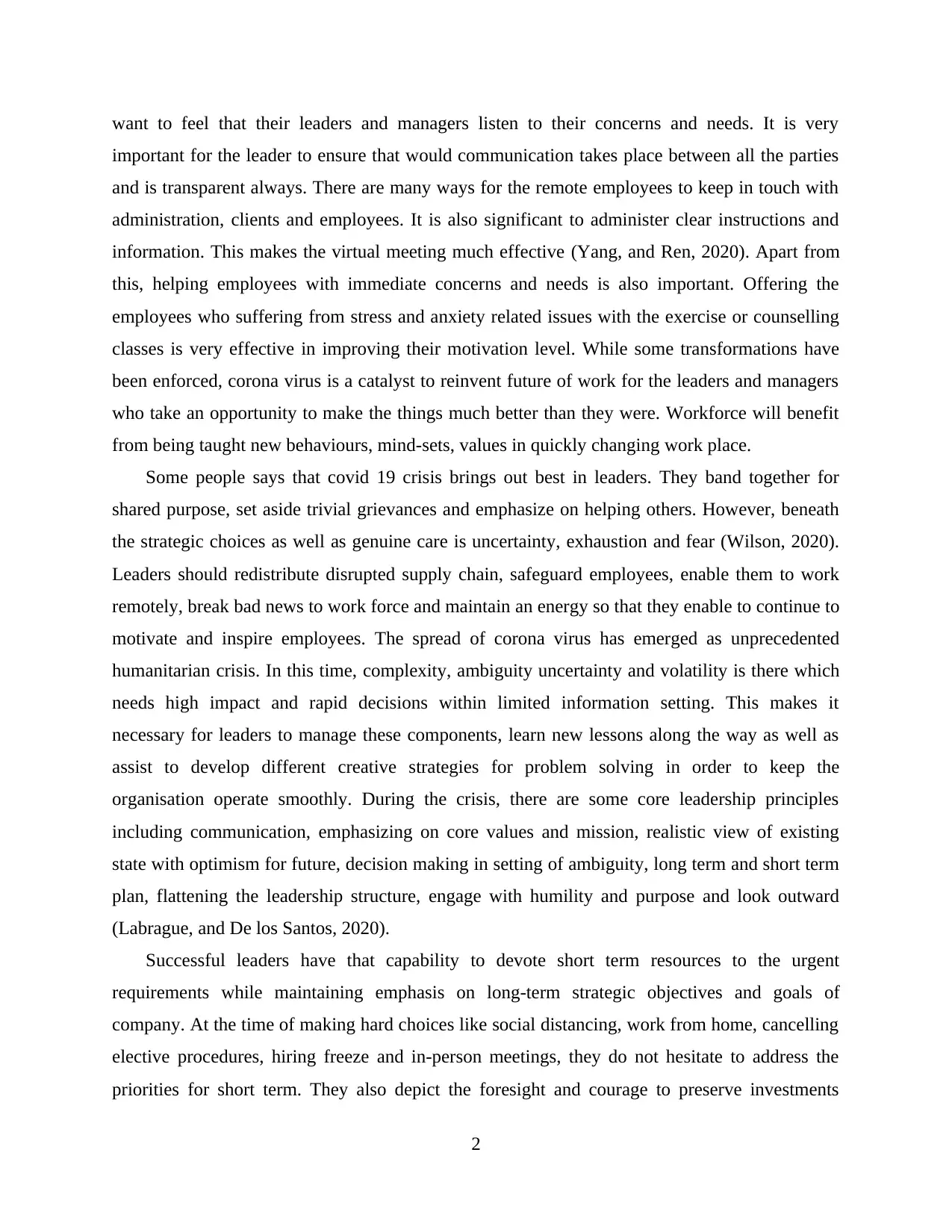
want to feel that their leaders and managers listen to their concerns and needs. It is very
important for the leader to ensure that would communication takes place between all the parties
and is transparent always. There are many ways for the remote employees to keep in touch with
administration, clients and employees. It is also significant to administer clear instructions and
information. This makes the virtual meeting much effective (Yang, and Ren, 2020). Apart from
this, helping employees with immediate concerns and needs is also important. Offering the
employees who suffering from stress and anxiety related issues with the exercise or counselling
classes is very effective in improving their motivation level. While some transformations have
been enforced, corona virus is a catalyst to reinvent future of work for the leaders and managers
who take an opportunity to make the things much better than they were. Workforce will benefit
from being taught new behaviours, mind-sets, values in quickly changing work place.
Some people says that covid 19 crisis brings out best in leaders. They band together for
shared purpose, set aside trivial grievances and emphasize on helping others. However, beneath
the strategic choices as well as genuine care is uncertainty, exhaustion and fear (Wilson, 2020).
Leaders should redistribute disrupted supply chain, safeguard employees, enable them to work
remotely, break bad news to work force and maintain an energy so that they enable to continue to
motivate and inspire employees. The spread of corona virus has emerged as unprecedented
humanitarian crisis. In this time, complexity, ambiguity uncertainty and volatility is there which
needs high impact and rapid decisions within limited information setting. This makes it
necessary for leaders to manage these components, learn new lessons along the way as well as
assist to develop different creative strategies for problem solving in order to keep the
organisation operate smoothly. During the crisis, there are some core leadership principles
including communication, emphasizing on core values and mission, realistic view of existing
state with optimism for future, decision making in setting of ambiguity, long term and short term
plan, flattening the leadership structure, engage with humility and purpose and look outward
(Labrague, and De los Santos, 2020).
Successful leaders have that capability to devote short term resources to the urgent
requirements while maintaining emphasis on long-term strategic objectives and goals of
company. At the time of making hard choices like social distancing, work from home, cancelling
elective procedures, hiring freeze and in-person meetings, they do not hesitate to address the
priorities for short term. They also depict the foresight and courage to preserve investments
2
important for the leader to ensure that would communication takes place between all the parties
and is transparent always. There are many ways for the remote employees to keep in touch with
administration, clients and employees. It is also significant to administer clear instructions and
information. This makes the virtual meeting much effective (Yang, and Ren, 2020). Apart from
this, helping employees with immediate concerns and needs is also important. Offering the
employees who suffering from stress and anxiety related issues with the exercise or counselling
classes is very effective in improving their motivation level. While some transformations have
been enforced, corona virus is a catalyst to reinvent future of work for the leaders and managers
who take an opportunity to make the things much better than they were. Workforce will benefit
from being taught new behaviours, mind-sets, values in quickly changing work place.
Some people says that covid 19 crisis brings out best in leaders. They band together for
shared purpose, set aside trivial grievances and emphasize on helping others. However, beneath
the strategic choices as well as genuine care is uncertainty, exhaustion and fear (Wilson, 2020).
Leaders should redistribute disrupted supply chain, safeguard employees, enable them to work
remotely, break bad news to work force and maintain an energy so that they enable to continue to
motivate and inspire employees. The spread of corona virus has emerged as unprecedented
humanitarian crisis. In this time, complexity, ambiguity uncertainty and volatility is there which
needs high impact and rapid decisions within limited information setting. This makes it
necessary for leaders to manage these components, learn new lessons along the way as well as
assist to develop different creative strategies for problem solving in order to keep the
organisation operate smoothly. During the crisis, there are some core leadership principles
including communication, emphasizing on core values and mission, realistic view of existing
state with optimism for future, decision making in setting of ambiguity, long term and short term
plan, flattening the leadership structure, engage with humility and purpose and look outward
(Labrague, and De los Santos, 2020).
Successful leaders have that capability to devote short term resources to the urgent
requirements while maintaining emphasis on long-term strategic objectives and goals of
company. At the time of making hard choices like social distancing, work from home, cancelling
elective procedures, hiring freeze and in-person meetings, they do not hesitate to address the
priorities for short term. They also depict the foresight and courage to preserve investments
2
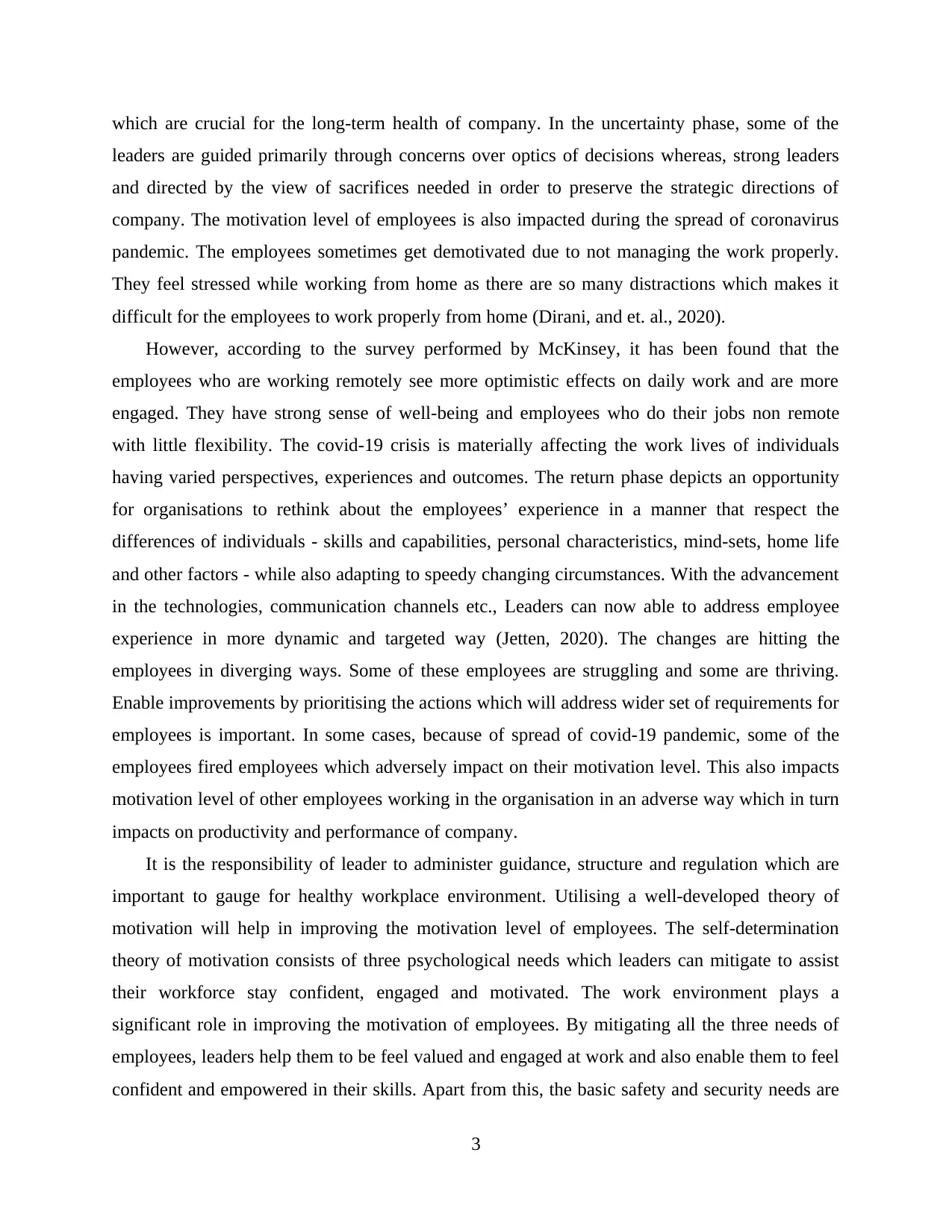
which are crucial for the long-term health of company. In the uncertainty phase, some of the
leaders are guided primarily through concerns over optics of decisions whereas, strong leaders
and directed by the view of sacrifices needed in order to preserve the strategic directions of
company. The motivation level of employees is also impacted during the spread of coronavirus
pandemic. The employees sometimes get demotivated due to not managing the work properly.
They feel stressed while working from home as there are so many distractions which makes it
difficult for the employees to work properly from home (Dirani, and et. al., 2020).
However, according to the survey performed by McKinsey, it has been found that the
employees who are working remotely see more optimistic effects on daily work and are more
engaged. They have strong sense of well-being and employees who do their jobs non remote
with little flexibility. The covid-19 crisis is materially affecting the work lives of individuals
having varied perspectives, experiences and outcomes. The return phase depicts an opportunity
for organisations to rethink about the employees’ experience in a manner that respect the
differences of individuals - skills and capabilities, personal characteristics, mind-sets, home life
and other factors - while also adapting to speedy changing circumstances. With the advancement
in the technologies, communication channels etc., Leaders can now able to address employee
experience in more dynamic and targeted way (Jetten, 2020). The changes are hitting the
employees in diverging ways. Some of these employees are struggling and some are thriving.
Enable improvements by prioritising the actions which will address wider set of requirements for
employees is important. In some cases, because of spread of covid-19 pandemic, some of the
employees fired employees which adversely impact on their motivation level. This also impacts
motivation level of other employees working in the organisation in an adverse way which in turn
impacts on productivity and performance of company.
It is the responsibility of leader to administer guidance, structure and regulation which are
important to gauge for healthy workplace environment. Utilising a well-developed theory of
motivation will help in improving the motivation level of employees. The self-determination
theory of motivation consists of three psychological needs which leaders can mitigate to assist
their workforce stay confident, engaged and motivated. The work environment plays a
significant role in improving the motivation of employees. By mitigating all the three needs of
employees, leaders help them to be feel valued and engaged at work and also enable them to feel
confident and empowered in their skills. Apart from this, the basic safety and security needs are
3
leaders are guided primarily through concerns over optics of decisions whereas, strong leaders
and directed by the view of sacrifices needed in order to preserve the strategic directions of
company. The motivation level of employees is also impacted during the spread of coronavirus
pandemic. The employees sometimes get demotivated due to not managing the work properly.
They feel stressed while working from home as there are so many distractions which makes it
difficult for the employees to work properly from home (Dirani, and et. al., 2020).
However, according to the survey performed by McKinsey, it has been found that the
employees who are working remotely see more optimistic effects on daily work and are more
engaged. They have strong sense of well-being and employees who do their jobs non remote
with little flexibility. The covid-19 crisis is materially affecting the work lives of individuals
having varied perspectives, experiences and outcomes. The return phase depicts an opportunity
for organisations to rethink about the employees’ experience in a manner that respect the
differences of individuals - skills and capabilities, personal characteristics, mind-sets, home life
and other factors - while also adapting to speedy changing circumstances. With the advancement
in the technologies, communication channels etc., Leaders can now able to address employee
experience in more dynamic and targeted way (Jetten, 2020). The changes are hitting the
employees in diverging ways. Some of these employees are struggling and some are thriving.
Enable improvements by prioritising the actions which will address wider set of requirements for
employees is important. In some cases, because of spread of covid-19 pandemic, some of the
employees fired employees which adversely impact on their motivation level. This also impacts
motivation level of other employees working in the organisation in an adverse way which in turn
impacts on productivity and performance of company.
It is the responsibility of leader to administer guidance, structure and regulation which are
important to gauge for healthy workplace environment. Utilising a well-developed theory of
motivation will help in improving the motivation level of employees. The self-determination
theory of motivation consists of three psychological needs which leaders can mitigate to assist
their workforce stay confident, engaged and motivated. The work environment plays a
significant role in improving the motivation of employees. By mitigating all the three needs of
employees, leaders help them to be feel valued and engaged at work and also enable them to feel
confident and empowered in their skills. Apart from this, the basic safety and security needs are
3
⊘ This is a preview!⊘
Do you want full access?
Subscribe today to unlock all pages.

Trusted by 1+ million students worldwide
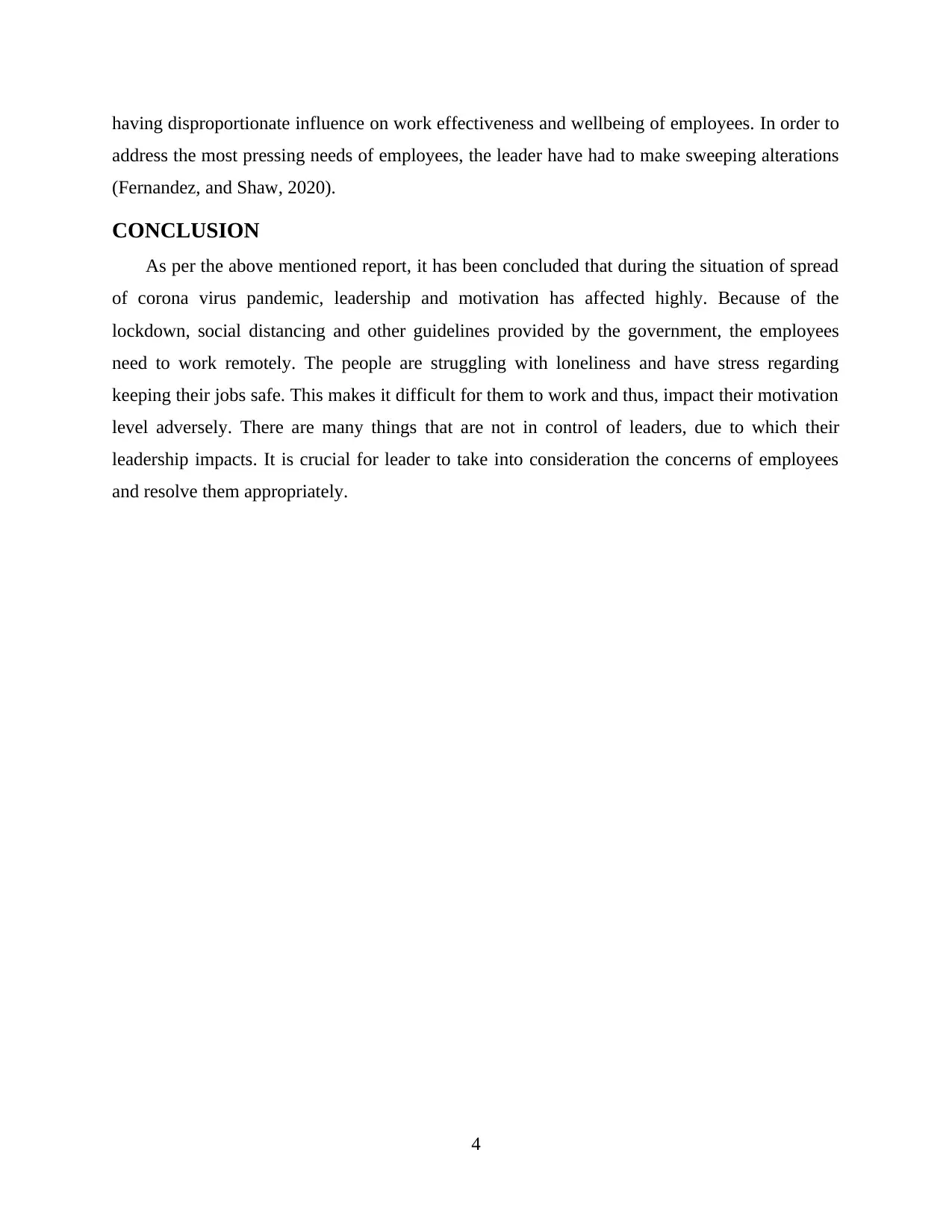
having disproportionate influence on work effectiveness and wellbeing of employees. In order to
address the most pressing needs of employees, the leader have had to make sweeping alterations
(Fernandez, and Shaw, 2020).
CONCLUSION
As per the above mentioned report, it has been concluded that during the situation of spread
of corona virus pandemic, leadership and motivation has affected highly. Because of the
lockdown, social distancing and other guidelines provided by the government, the employees
need to work remotely. The people are struggling with loneliness and have stress regarding
keeping their jobs safe. This makes it difficult for them to work and thus, impact their motivation
level adversely. There are many things that are not in control of leaders, due to which their
leadership impacts. It is crucial for leader to take into consideration the concerns of employees
and resolve them appropriately.
4
address the most pressing needs of employees, the leader have had to make sweeping alterations
(Fernandez, and Shaw, 2020).
CONCLUSION
As per the above mentioned report, it has been concluded that during the situation of spread
of corona virus pandemic, leadership and motivation has affected highly. Because of the
lockdown, social distancing and other guidelines provided by the government, the employees
need to work remotely. The people are struggling with loneliness and have stress regarding
keeping their jobs safe. This makes it difficult for them to work and thus, impact their motivation
level adversely. There are many things that are not in control of leaders, due to which their
leadership impacts. It is crucial for leader to take into consideration the concerns of employees
and resolve them appropriately.
4
Paraphrase This Document
Need a fresh take? Get an instant paraphrase of this document with our AI Paraphraser
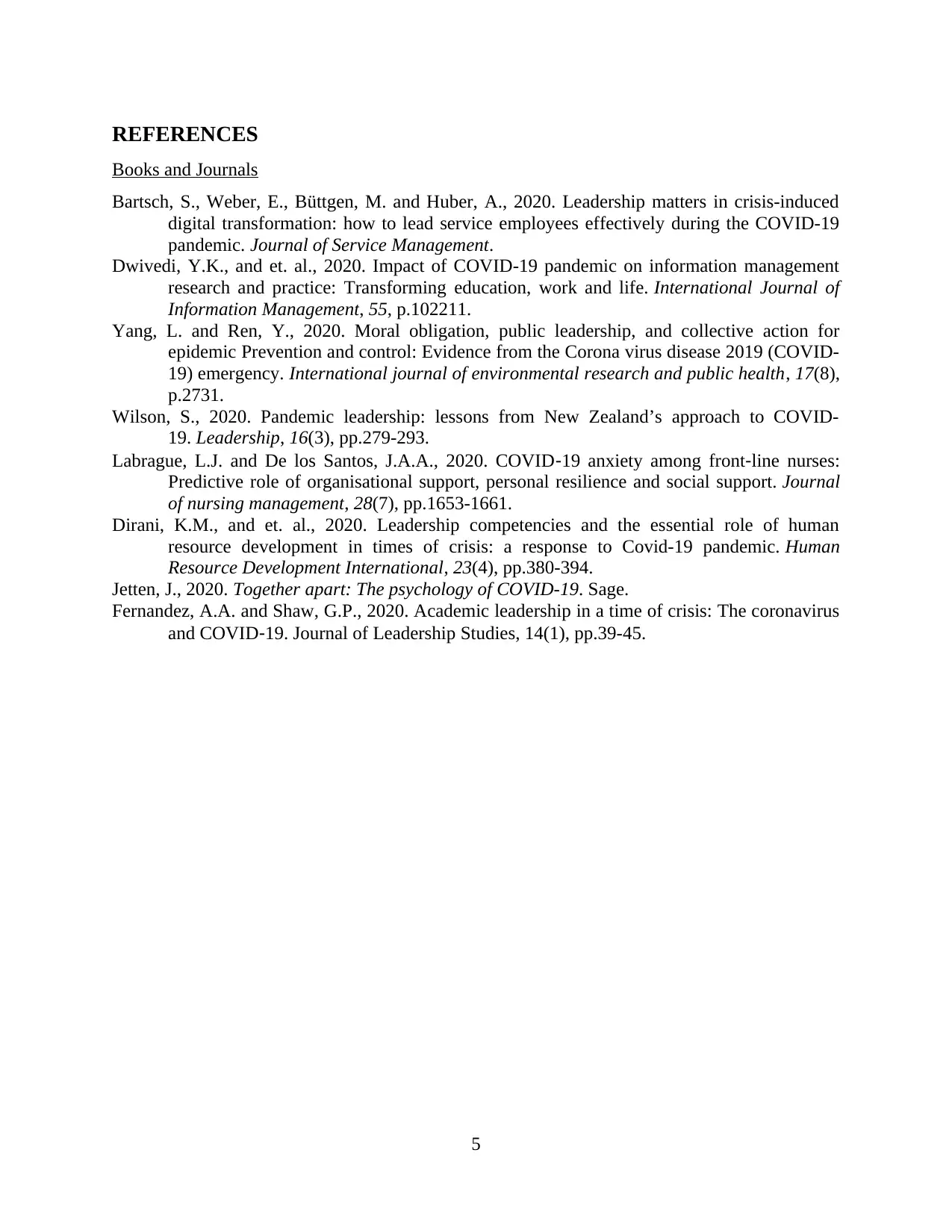
REFERENCES
Books and Journals
Bartsch, S., Weber, E., Büttgen, M. and Huber, A., 2020. Leadership matters in crisis-induced
digital transformation: how to lead service employees effectively during the COVID-19
pandemic. Journal of Service Management.
Dwivedi, Y.K., and et. al., 2020. Impact of COVID-19 pandemic on information management
research and practice: Transforming education, work and life. International Journal of
Information Management, 55, p.102211.
Yang, L. and Ren, Y., 2020. Moral obligation, public leadership, and collective action for
epidemic Prevention and control: Evidence from the Corona virus disease 2019 (COVID-
19) emergency. International journal of environmental research and public health, 17(8),
p.2731.
Wilson, S., 2020. Pandemic leadership: lessons from New Zealand’s approach to COVID-
19. Leadership, 16(3), pp.279-293.
Labrague, L.J. and De los Santos, J.A.A., 2020. COVID‐19 anxiety among front‐line nurses:
Predictive role of organisational support, personal resilience and social support. Journal
of nursing management, 28(7), pp.1653-1661.
Dirani, K.M., and et. al., 2020. Leadership competencies and the essential role of human
resource development in times of crisis: a response to Covid-19 pandemic. Human
Resource Development International, 23(4), pp.380-394.
Jetten, J., 2020. Together apart: The psychology of COVID-19. Sage.
Fernandez, A.A. and Shaw, G.P., 2020. Academic leadership in a time of crisis: The coronavirus
and COVID‐19. Journal of Leadership Studies, 14(1), pp.39-45.
5
Books and Journals
Bartsch, S., Weber, E., Büttgen, M. and Huber, A., 2020. Leadership matters in crisis-induced
digital transformation: how to lead service employees effectively during the COVID-19
pandemic. Journal of Service Management.
Dwivedi, Y.K., and et. al., 2020. Impact of COVID-19 pandemic on information management
research and practice: Transforming education, work and life. International Journal of
Information Management, 55, p.102211.
Yang, L. and Ren, Y., 2020. Moral obligation, public leadership, and collective action for
epidemic Prevention and control: Evidence from the Corona virus disease 2019 (COVID-
19) emergency. International journal of environmental research and public health, 17(8),
p.2731.
Wilson, S., 2020. Pandemic leadership: lessons from New Zealand’s approach to COVID-
19. Leadership, 16(3), pp.279-293.
Labrague, L.J. and De los Santos, J.A.A., 2020. COVID‐19 anxiety among front‐line nurses:
Predictive role of organisational support, personal resilience and social support. Journal
of nursing management, 28(7), pp.1653-1661.
Dirani, K.M., and et. al., 2020. Leadership competencies and the essential role of human
resource development in times of crisis: a response to Covid-19 pandemic. Human
Resource Development International, 23(4), pp.380-394.
Jetten, J., 2020. Together apart: The psychology of COVID-19. Sage.
Fernandez, A.A. and Shaw, G.P., 2020. Academic leadership in a time of crisis: The coronavirus
and COVID‐19. Journal of Leadership Studies, 14(1), pp.39-45.
5
1 out of 8
Related Documents
Your All-in-One AI-Powered Toolkit for Academic Success.
+13062052269
info@desklib.com
Available 24*7 on WhatsApp / Email
![[object Object]](/_next/static/media/star-bottom.7253800d.svg)
Unlock your academic potential
Copyright © 2020–2025 A2Z Services. All Rights Reserved. Developed and managed by ZUCOL.





